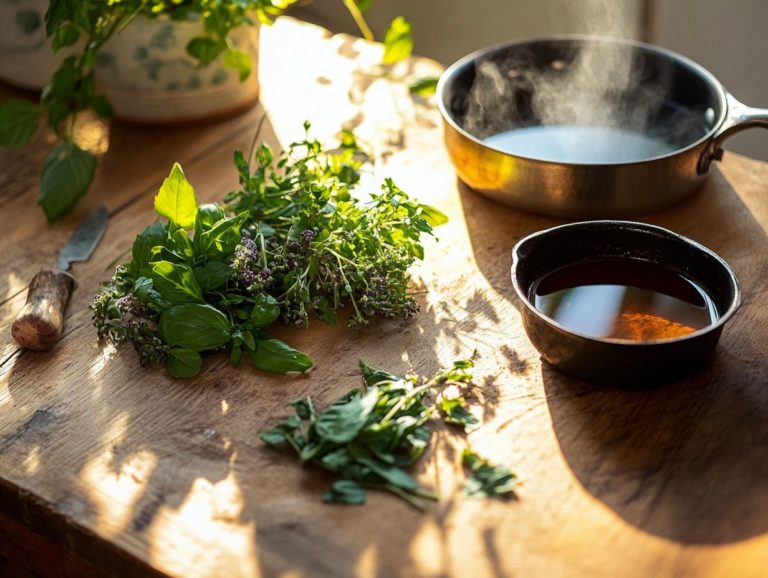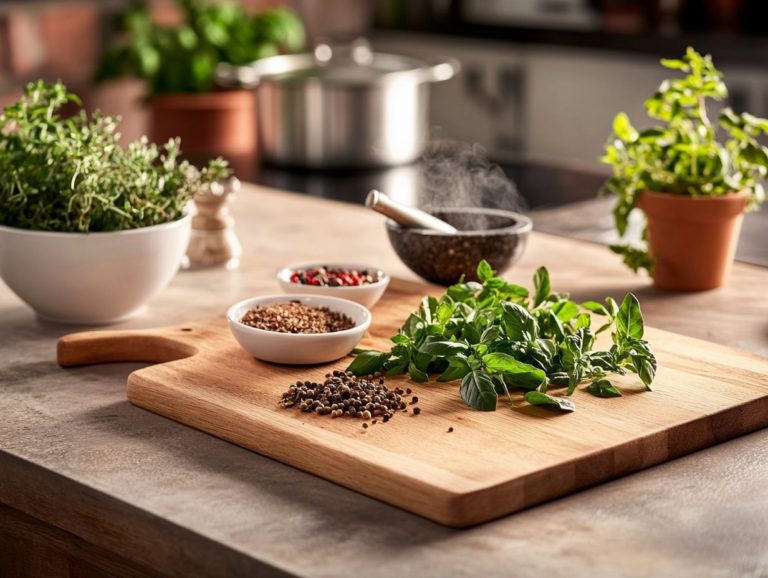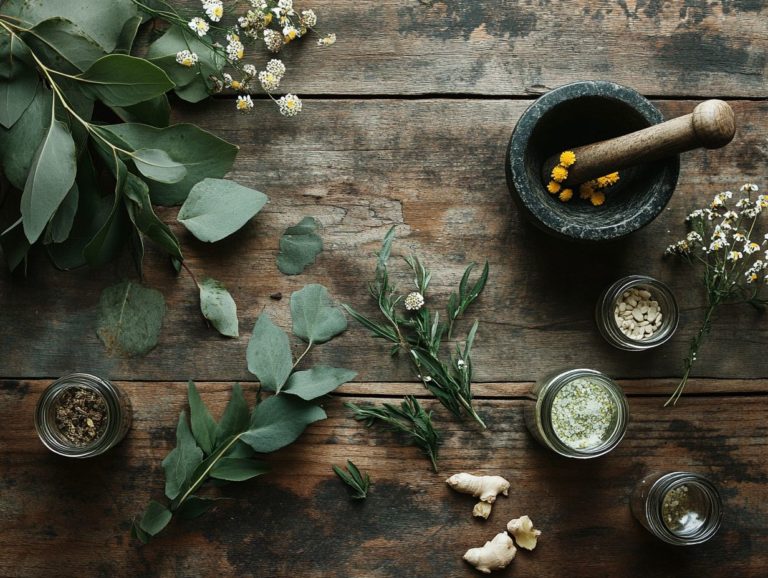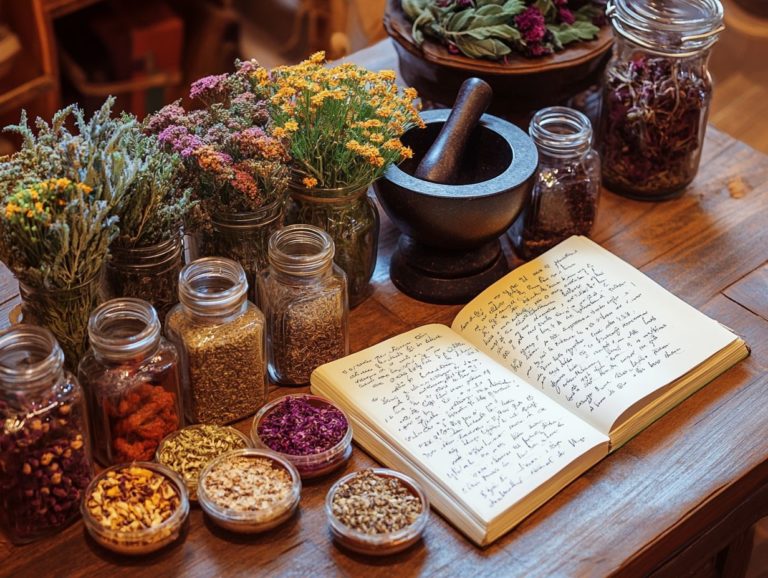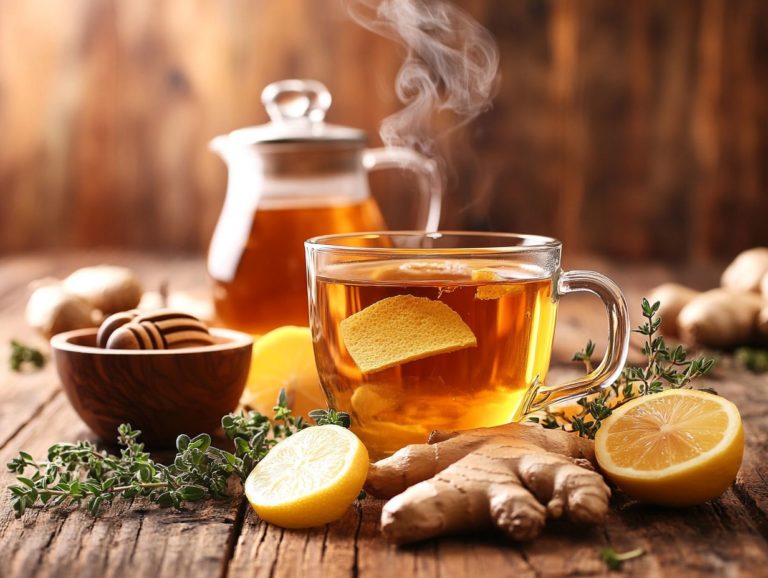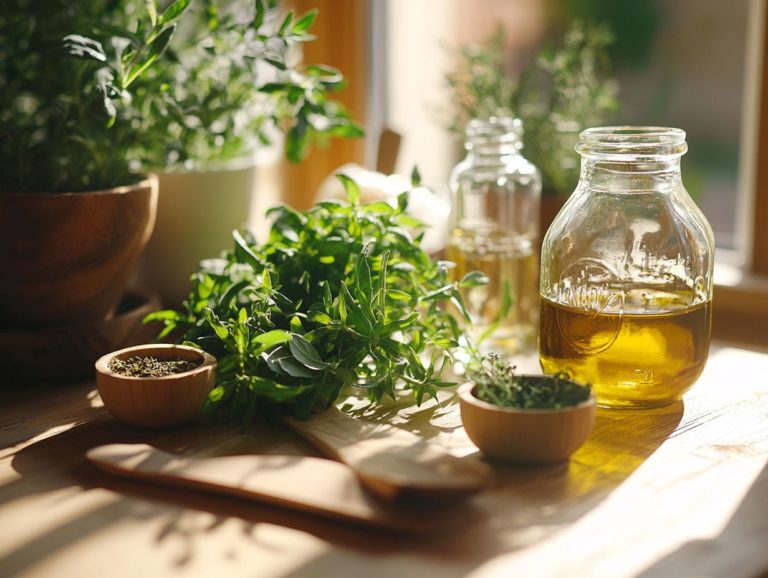Crafting Herbal Remedies with Kitchen Spices
Herbal remedies have become a sought-after natural approach to health and wellness, often inspired by the spices you already have in your kitchen, including unique blends like Herbs de Provence.
From alleviating headaches to calming colds, these everyday ingredients are packed with remarkable medicinal properties. This article explores the benefits of utilizing kitchen spices in herbal remedies and offers effective crafting techniques along with straightforward recipes for addressing common ailments while discovering flavor possibilities through culinary applications.
You ll also find essential safety considerations included, ensuring you can confidently harness the healing power of herbs. Get ready to unleash the amazing power of your pantry s hidden treasures!
Contents
- Key Takeaways:
- Benefits of Using Kitchen Spices in Herbal Remedies
- Methods for Crafting Herbal Remedies with Kitchen Spices
- Recipes for Common Ailments
- Safety Considerations and Side Effects
- Frequently Asked Questions
- What are the benefits of crafting herbal remedies with kitchen spices?
- What are some commonly used kitchen spices for crafting herbal remedies, along with organic herbs from brands like RawSpiceBar?
- Can I use store-bought spices for making herbal remedies?
- What types of health issues can be addressed with herbal remedies made from kitchen spices?
- Are there any precautions I should take when using kitchen spices for herbal remedies?
- Can I combine different kitchen spices in one herbal remedy?
Key Takeaways:
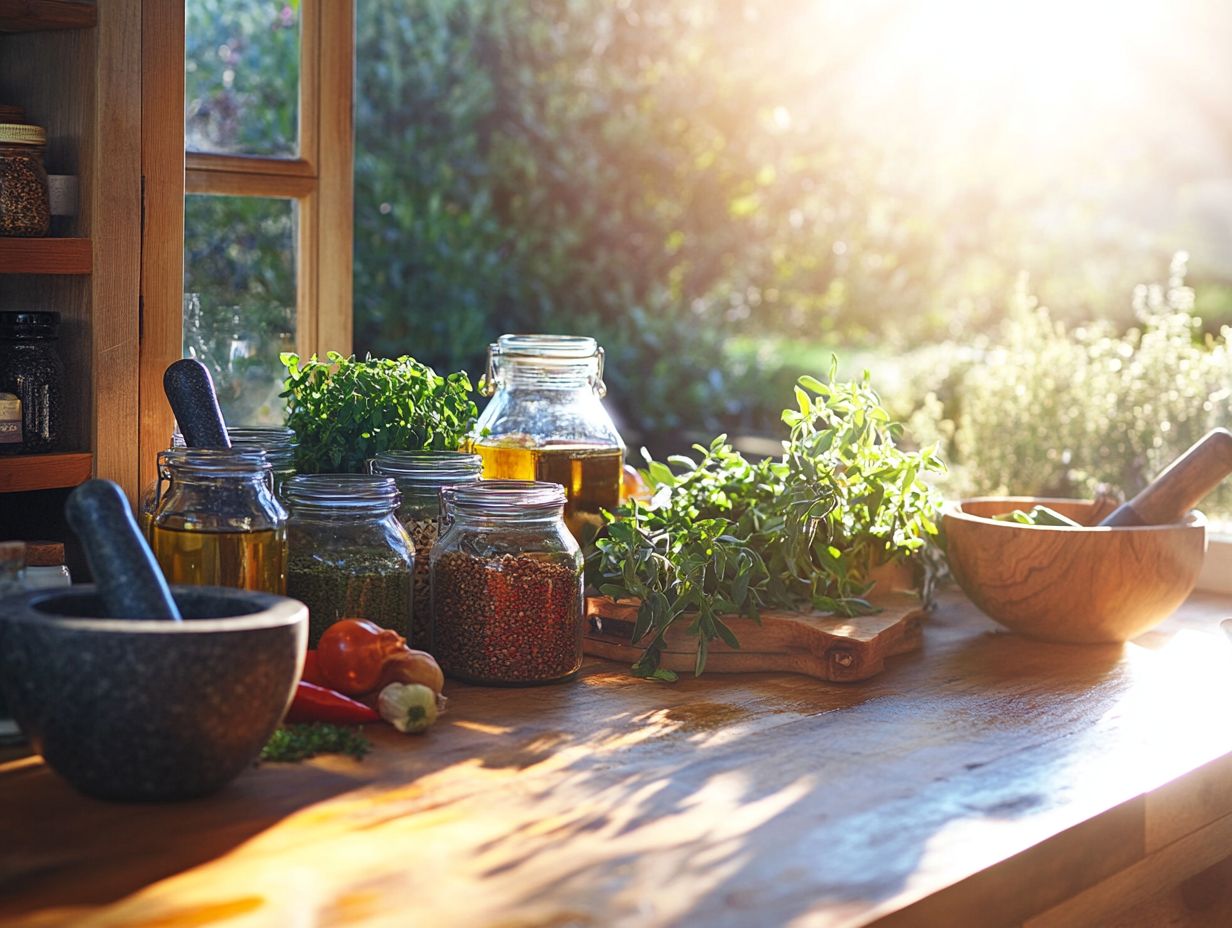
- Kitchen spices in herbal remedies provide a natural approach to healing and maintaining overall health.
- Infusions and decoctions allow for easy crafting of herbal remedies using common kitchen spices.
- Taking safety precautions when using herbal remedies can bring numerous health benefits.
What are Herbal Remedies and How Do They Work?
Herbal remedies have stood the test of time, especially in the culinary traditions of regions like southeastern France, where premium herbs such as thyme, rosemary, and lavender are essential. These remedies tap into the therapeutic properties of various aromatic herbs, presenting a natural pathway to health and wellness.
By using infusion techniques, which involve steeping herbs in hot water, you can craft powerful herbal concoctions that cater to your specific needs, ultimately enhancing your overall well-being.
These practices have been woven into diverse cultures, often captured in ancient texts and passed down through generations. The art of infusion like steeping dried chamomile for soothing teas highlights the remarkable versatility of herbal solutions.
Each herb possesses unique properties: ginger for combating inflammation and turmeric for its antioxidant benefits, showcasing their essential role in holistic health.
As contemporary wellness trends shift back toward natural remedies, many are rediscovering the profound benefits of these time-honored practices, merging tradition with modern insights for a boost in vitality.
Benefits of Using Kitchen Spices in Herbal Remedies
Incorporating kitchen spices into your herbal remedies can elevate their effectiveness and flavor. This provides an opportunity to explore a range of culinary applications while enjoying health benefits.
Spices like turmeric, ginger, and cumin not only impart unique flavors to your dishes but also enhance the therapeutic properties of herbal concoctions, making them invaluable additions to your wellness routine.
Common Kitchen Spices and Their Medicinal Properties
Common kitchen spices like turmeric, ginger, and black pepper offer remarkable medicinal properties that can greatly enhance your health. Turmeric is celebrated for its anti-inflammatory effects, while ginger is known for its digestive benefits, making these spices invaluable in both cooking and health regimens.
You’ll often find these spices incorporated into natural tonics or infusions to fully harness their health benefits. For instance, a warm turmeric latte can be a soothing addition to your daily routine, providing anti-inflammatory support with every delicious sip. Similarly, sipping on ginger tea made by steeping fresh ginger in hot water not only comforts but also alleviates nausea and aids digestion. When creating these herbal remedies, it’s important to follow safety tips for creating herbal remedies to ensure their effectiveness and your well-being.
Let s not forget about black pepper, commonly used as a seasoning, which improves how well your body can use curcumin in turmeric, making it even more effective. By exploring the synergy between these spices, you can embrace creative culinary practices that promote wellness while delighting your palate.
Start using kitchen spices in your herbal remedies today for a healthier lifestyle!
Methods for Crafting Herbal Remedies with Kitchen Spices
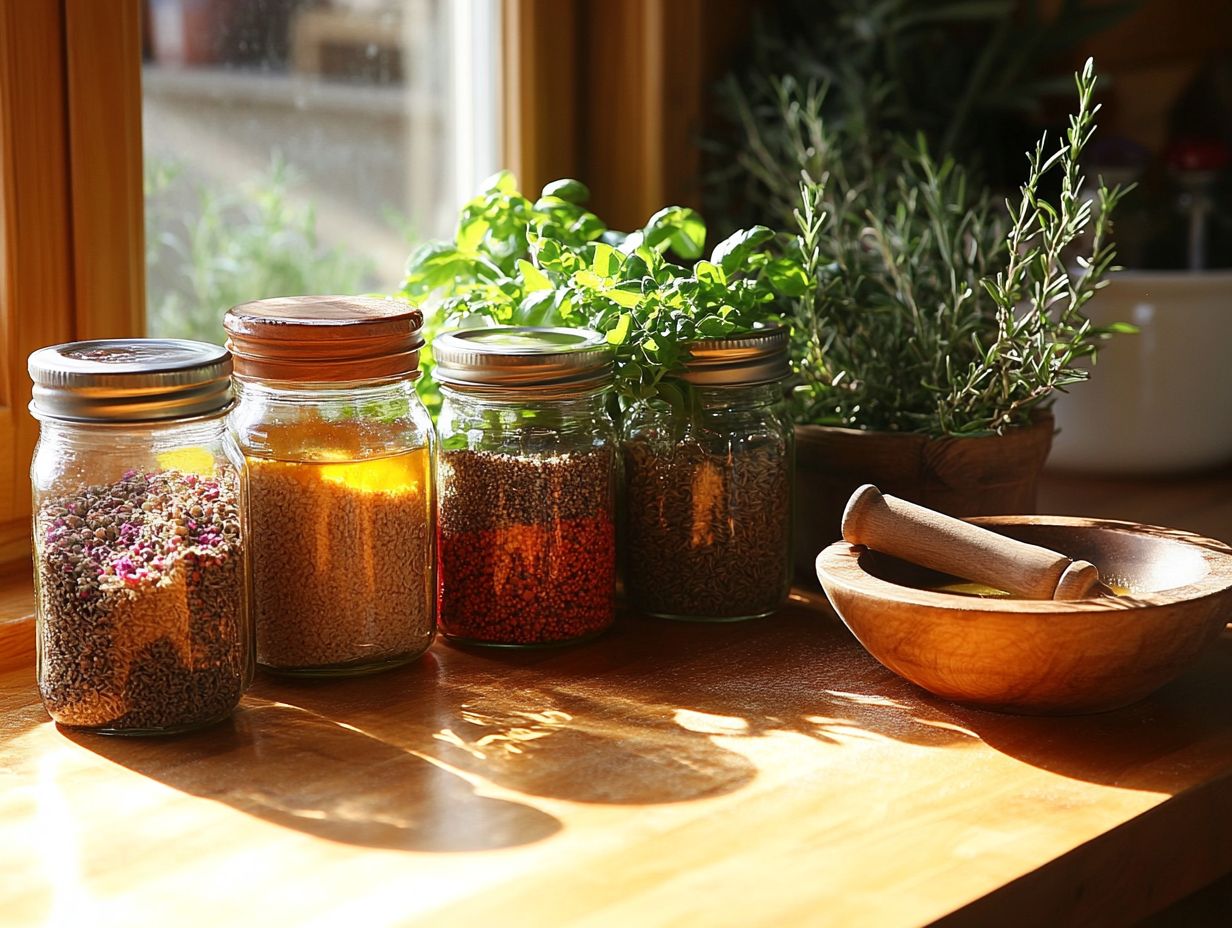
Crafting herbal remedies using kitchen spices opens up a world of possibilities. Techniques such as infusion and decoctions (a method involving boiling plant material) utilize the unique properties of culinary herbs. This enhances both their therapeutic effects and the flavors in your dishes.
This approach transforms the process into an experience that is as beneficial as it is enjoyable. You can enrich your health and cooking skills simultaneously.
Infusions, Decoctions, and More
Infusions and decoctions are the two primary methods for crafting herbal remedies. These methods enable you to extract essential flavors and benefits from various herbs and spices. With infusions, you steep herbs in hot water; decoctions require simmering the plant material.
Each method offers its own unique flavor profile and health benefits. This makes it crucial for anyone aiming to weave kitchen spices into their wellness routine, including those interested in how to create herbal skin treatments at home.
Infusions are excellent for delicate flowers and leaves, like chamomile and peppermint, where a simple steeping in hot water captures their subtle flavors and soothing properties. In contrast, use decoctions for tougher materials such as roots and barks think ginger and cinnamon. The longer cooking time allows these robust ingredients to release their rich flavors and medicinal qualities.
Mastering these techniques allows you to tailor your herbal preparations to meet specific health objectives. Try whipping up an invigorating ginger decoction to boost digestion or enjoy a calming chamomile infusion to promote relaxation. You can also explore the art of crafting herbal bath salts for a soothing experience.
Recipes for Common Ailments
Discover fun and effective recipes to tackle common ailments using kitchen spices and herbal remedies. These recipes beautifully blend cooking skills with wellness, resulting in effective solutions that are as enjoyable as they are beneficial.
Imagine the comfort of preparing a soothing ginger tea to ease nausea or a turmeric-infused concoction to combat inflammation.
Using Kitchen Spices to Treat Headaches, Colds, and More
Kitchen spices can be your go-to natural remedies for ailments like headaches and colds. Ginger is renowned for alleviating headaches, while spices such as oregano and thyme help fight off cold symptoms. This illustrates the remarkable potential of herbal remedies in your everyday wellness routine.
Curcumin, found in turmeric, boasts anti-inflammatory properties that can ease pain and bolster your immune system. Research shows that compounds like gingerol in ginger and rosmarinic acid in oregano play significant roles in these spices’ effectiveness. To enhance the benefits of these spices, consider how to spice up your herbal tea for a delicious and healthful boost.
Try making ginger tea now for instant relief from headaches. A simple recipe involves steeping fresh slices in hot water. Meanwhile, a broth infused with oregano and thyme might just be the remedy you need to clear congestion. For those interested in natural solutions, DIY herbal remedies for digestive health can also be beneficial. Incorporating these spices into your daily meals elevates flavor and enhances your overall health.
Safety Considerations and Side Effects
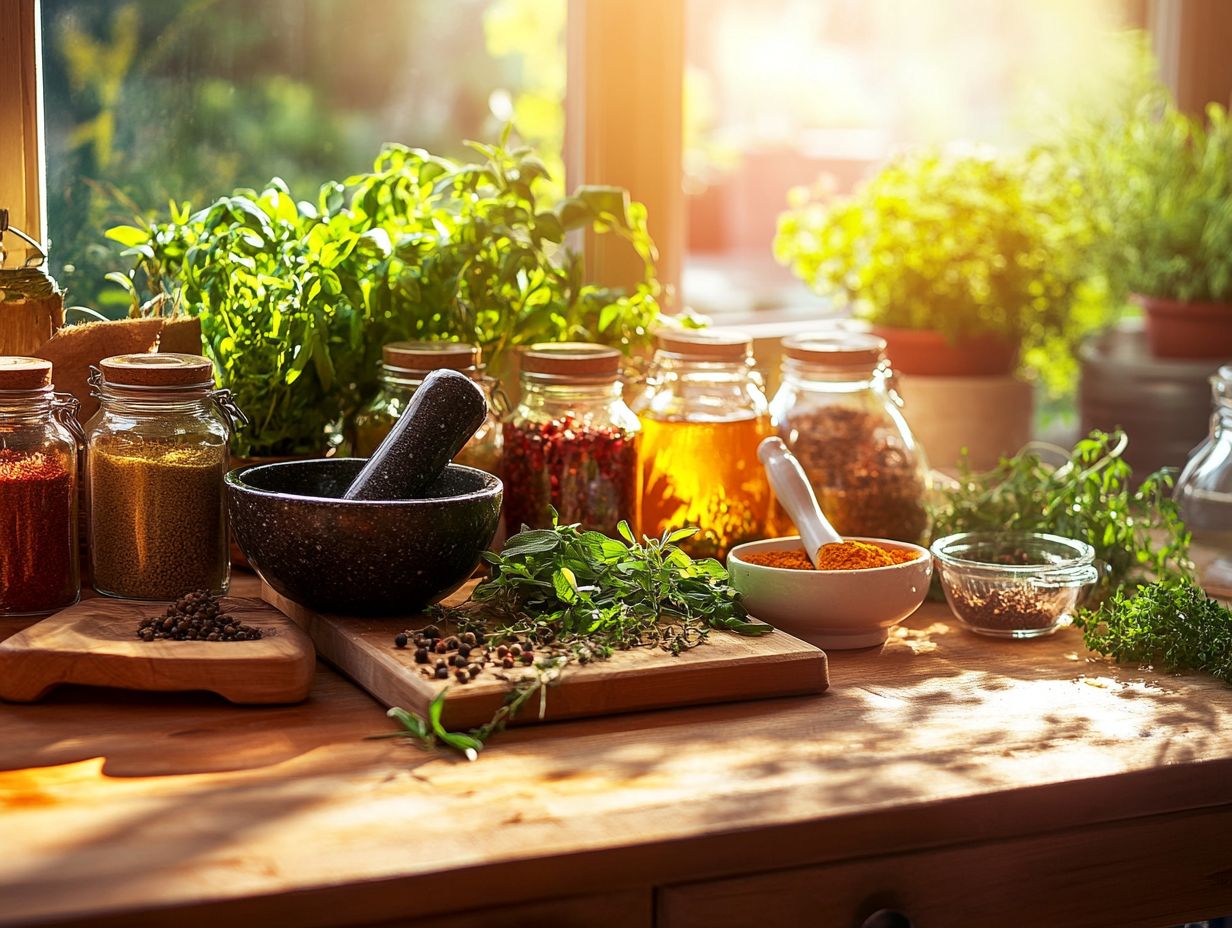
When exploring herbal remedies and kitchen spices for their myriad health benefits, it’s essential to consider safety and potential side effects to avoid any adverse reactions. Always consult with a healthcare professional before trying new herbal remedies.
Certain individuals might find themselves allergic or sensitive to specific herbs. Understanding these factors empowers you to use herbal remedies safely and effectively in your daily life.
Precautions When Using Herbal Remedies
When you explore herbal remedies, taking certain precautions is crucial for your safety and to avoid unwanted side effects. By understanding proper dosages, potential allergens, and possible interactions with medications especially in culinary contexts you can embrace the benefits of kitchen spices while minimizing risks.
Before embarking on your herbal journey, it’s essential to consult with healthcare professionals. They can offer personalized guidance tailored to your health conditions and any medications you may be taking. Additionally, exploring crafting herbal tea blends for every mood can enhance your experience.
Doing your homework on specific herbs and their effects is also critical to ensuring both effectiveness and safety. Pay attention to how your body responds, as reactions can vary significantly from person to person. Keeping a detailed record of changes will help you assess the impact of the herbs you use, allowing you to make informed decisions for future applications.
Tips for Incorporating Herbal Remedies into Your Daily Routine
Incorporating herbal remedies into your daily routine can be rewarding when you adopt the right approach and enhance flavors with a personal touch. Start with small doses and gradually increase them; you ll discover unique blends that not only enhance flavors but also deliver impressive health benefits.
Get creative! Experiment with different combinations; try adding ginger to smoothies for a zingy boost or incorporating turmeric into rice dishes to tap into its anti-inflammatory properties. Additionally, crafting your own herbal remedies at home can enhance your meals and wellness. Setting aside time each week to plan meals featuring these herbs can catalyze a lifestyle shift towards wellness using high-quality herbs and unique blends.
Tea infusions offer a delightful way to savor the restorative effects of herbs like chamomile, rosemary, or peppermint to enhance flavors. To personalize your journey and tailor it to your needs, consider journaling your responses to various herbal remedies and infusion techniques. This practice can guide your future choices and help optimize the benefits of integrating these natural elements into your life. Additionally, you can explore crafting herbal compresses to further enhance your herbal experience.
Frequently Asked Questions
What are the benefits of crafting herbal remedies with kitchen spices?
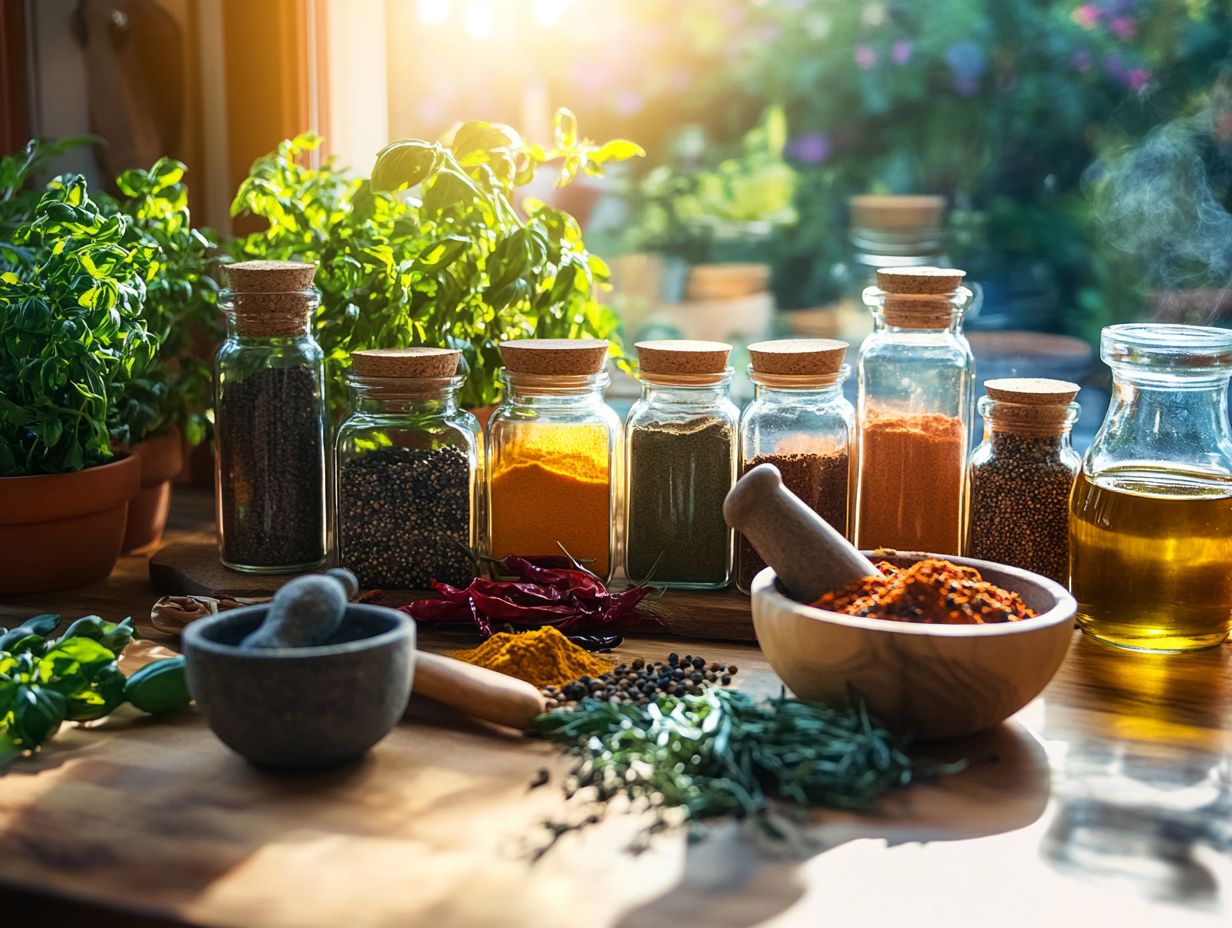
There are many benefits to creating herbal remedies with kitchen spices, including natural healing properties, accessibility, and cost-effectiveness.
What are some commonly used kitchen spices for crafting herbal remedies, along with organic herbs from brands like RawSpiceBar?
Some commonly used kitchen spices for crafting herbal remedies include cinnamon, ginger, turmeric, garlic, and cayenne pepper.
Can I use store-bought spices for making herbal remedies?
Yes, you can use store-bought spices for herbal remedies, but it’s important to choose high-quality, organic spices for maximum effectiveness.
What types of health issues can be addressed with herbal remedies made from kitchen spices?
Herbal remedies made from kitchen spices can help with various health issues, such as digestive problems, inflammation, headaches, and respiratory issues.
Are there any precautions I should take when using kitchen spices for herbal remedies?
Yes, it’s essential to research the potential side effects and interactions of the spices you plan to use. Always consult with a healthcare professional if you have any concerns or preexisting conditions.
Can I combine different kitchen spices in one herbal remedy?
Yes, you can combine kitchen spices to make a stronger remedy that fits your health needs.
Be sure to look up the right amounts and possible interactions before getting started.
Combining spices can lead to amazing health benefits!

